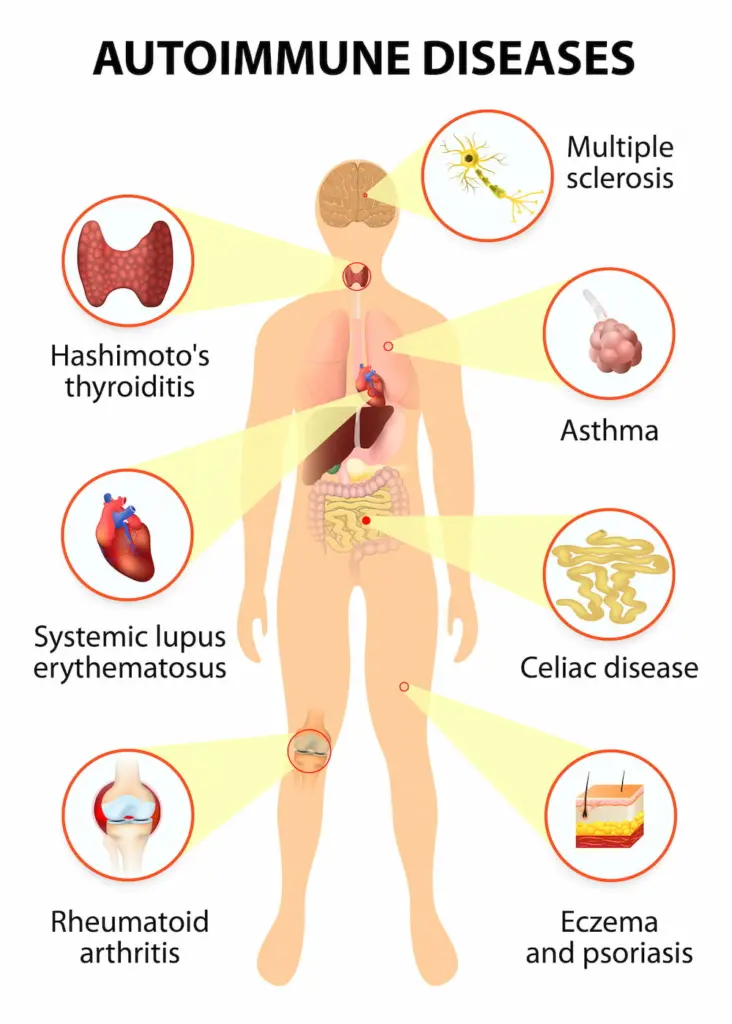

Can Autoimmune Disease Kill You? Shocking But Hopeful
Table of Contents
Early response to focus
First, and to focus more on the study, we must answer the question of this article:
Autoimmune diseases are not fatal by themselves, but according to the conditions and stages of the disease, they canhave very severe complications, cause significant damage to body tissues and organs and even lead to death.
A very important point that should be considered in answering this question is that if autoimmune diseases are identified in the early stages and properly treated and controlled, they can not lead to death.
This is because if it is not diagnosed on time and enters serious and critical stages, it will have irreparable complications, and death may be a very experienced result.
For this reason, very important issues will be investigated further in this article.
So, we invite you to explore fascinating statistics and the most important topics.
Introduction
The death rate in relatively unknown autoimmune diseases and the life expectancy of people with these types of diseases can be different based on the type of autoimmune disease and its treatment options.
Autoimmune diseases are the third leading cause of chronic disease in the United States. Although many autoimmune diseases are rare, the US National Institutes of Health estimates that 5 to 8 percent of the population is affected.
The bad news is that, for unknown reasons, the epidemic of autoimmune diseases is increasing.
But the good news is that the speed of scientific progress is unbelievable, and there have been many therapeutic advances in various types of autoimmune diseases, this promises to increase the life expectancy of those suffering from autoimmune diseases.
In this valuable research article from “drhealthandbeauty”, we have examined the statistics, morbidity, and mortality in the top 5 autoimmune diseases, and then we determine the life expectancy in each one.
And finally, we will answer the question of whether autoimmune diseases can lead to death.

What do statistics say?
You must also know that the main reason for Will Smith’s historic slap to Chris Rock at this year’s Oscar ceremony was the host’s careless reference to Smith’s wife’s lupus. Lupus belongs to the group of autoimmune diseases. A group of diseases that is spreading at an amazing rate every year and affects millions of people in the world.
According to the United States National Stem Cell Institute, nearly 4% of the world’s population [about 320 million people] have one of more than 80 different types of autoimmune diseases, the most common of which are type 1 diabetes, MS (multiple sclerosis), and rheumatoid arthritis. Lupus, Crohn’s disease, psoriasis and scleroderma.

Rheumatoid arthritis
Rheumatism is not usually fatal, but the complications and symptoms of this disease can shorten a person’s life. No one knows how their lifespan will be affected by rheumatoid, so it is important to know what affects the patient’s lifespan, including the progression and exacerbation of the disease, lifestyle, and stress, which play a key role in the development of rheumatism, and others.
Scientific research on longevity
In 1981, researchers at the National Hospital for Rheumatic Diseases in England reported on 100 patients with rheumatoid arthritis who were followed from the first months of their illness to 18 years.
Of the 100 cases studied, it took an average of 43 years from the time they were diagnosed with the disease and then died. Rheumatoid directly led to 17 of these deaths. Twenty-seven of the study subjects were from causes unrelated to rheumatoid arthritis.
A 2014 study out of England found a significant improvement in life expectancy among people with RA compared to studies 25 years ago.
The researchers collected data from 1986 to 1998 and then did the same for the years 2002 to 2012. Deaths from this autoimmune disease decreased by 27 per cent. There are several factors associated with both studies, but researchers believe the reduced mortality is related to advances in RA research and treatment.
RA treatment and research have come a long way over the past few decades, and the outlook for RA patients has improved. Today, doctors understand how to diagnose this disease quickly and how to help people with the best way to manage symptoms and follow-up treatment to prevent the disease from progressing.
Things that shorten the lifespan of rheumatism
Of course, in cases of this type of arthritis, where people suffer from severe symptoms and do not respond to treatment, it unfortunately leads to a shorter lifespan.
Researchers are unable to accurately determine life expectancy for people with RA. But in general, people with rheumatoid arthritis can expect to live about 10 years shorter than healthy people.
According to this new study, like the 2014 study mentioned above, the life expectancy gap for people with RA is smaller, perhaps due to improved treatment and awareness of the complications of rheumatism.
.
Factors affecting the longevity of rheumatoid arthritis
The lifespan of RA is determined by a number of factors, including:
.
Complications:
People with rheumatism are more exposed to health complications because their immune system is weakening.
People with RA have an increased risk of certain cancers, as well as breathing problems, infections, lung ulcers, and heart disease.
.Related: “Warning Signs For Women’s Heart Disease“
Gender:
RA tends to progress more in women, which can lead to severe complications.
While RA is less severe in men, men with arthritis are at a higher risk of heart disease associated with RA inflammation.
.
Women are two to three times more likely to develop arthritis than men, and women’s symptoms are worse than men’s.
.
Age:
When the age increases, the probability of contracting this disease increases, and it is more likely that the symptoms and complications will become more severe. This is because the duration of the disease is longer.
smoking:
People with rheumatoid arthritis are advised not to smoke. Research shows a strong association between smoking and the severity of RA.
Smoking causes the lungs to become inflamed and may even activate antibodies that cause RA to develop. In addition, having a weak immune system can lead to respiratory disorders.
Positive and negative RA:
People who are positive for RA have a more severe form of rheumatism, which means they have joint deformities, inflammation outside the joints (i.e. the limbs) and an increased risk of developing disability.
.
Improved longevity
The goal of RA treatment is to decrease joint pain and enhance symptoms and quality of life.
An effective treatment plan with the help and supervision of a rheumatologist can be a good solution for prevention or treatment.
There is no perfect cure for RA, but the right treatment may help patients achieve remission and significantly increase their lifespan.
This correct treatment process includes avoiding arthritis-prohibited foods and choosing the right lifestyle, including adding exercise to your daily routine.
Early and aggressive treatments with antirheumatic drugs and biologics that can modify disease progression can improve quality of life and life expectancy.

Lupus
The life expectancy rate in lupus patients is more than 90%
A rheumatology specialist stated that lupus is an autoimmune disease that is more common in women than men and can in any type of lupus involve several organs along with skin manifestations, fever, fatigue, joint problems and kidney problems.
This disease occurs when the body’s immune system begins to attack tissues and organs.
It is important to pay attention to the fact that lupus is not like rheumatoid arthritis, where the joints are destroyed and can be treated by prescribing light drugs.
Arthritis has more of a diagnostic symptom and warning activity, and according to global statistics, about three out of every ten thousand people are affected by this disease.
However, there are no accurate statistics on the number of lupus patients in the country.
In addition, you should know that the cause of lupus is unknown, but contrary to the belief of some people who considered this disease dangerous in the past and thought that lupus causes disability and reduces the possibility of fertility, this is not the case now.
Because despite advanced tests and access to rheumatology specialists, the disease can be diagnosed earlier.
At present, the diagnosis, treatment and medicines of lupus patients are of such high quality that the life expectancy rate of these people has increased to more than 90%.
.
70% of lupus patients are sensitive to sunlight
Stress, exposure to sunlight, smoking, taking drugs such as anti-epileptic drugs, blood pressure, and some types of antibiotics aggravate lupus.
However, the patients usually get better after stopping the medication.
Of course, it should be kept in mind that if this disease is not diagnosed on time, one of its most important symptoms of lupus is the inflammation that appears with the onset of this disease and can cause kidney failure and damage to the kidneys, memory disorders, anemia, Bleeding, inflammation of vessels, lung diseases and heart diseases and also increases the risk of infection, cancer and pregnancy problems. And these side effects can be life-threatening.
A very important point is that specialists should give this training to patients so that they have updated information about their disease and get treated as soon as possible.
Because according to the obtained statistics, 30% of lupus patients stopped taking the drugs after 18 years. Discontinuation of the drug should be under the supervision of a rheumatologist.

Psoriatic arthritis
Despite the obvious rash in psoriasis, the disease is not considered just a skin disease, but is now recognized as a complex inflammatory disorder that involves multiple body systems.
The bad news is that the age of death is significantly lower among patients with severe psoriasis in both men and women.
Early onset of psoriasis may predispose individuals to comorbidities that significantly shorten life expectancy.
Psoriasis can reduce life expectancy by ten years or more. On average, patients whose psoriasis was diagnosed before the age of 25 did not survive until the age of 60.
On the other hand, the diagnosis of psoriasis at the age of 25 or later has been associated with an average life expectancy of more than 70 years.
This difference emphasizes the need to diagnose psoriasis and start treatment to cure the disease and possibly increase life expectancy by avoiding co-morbidities related to psoriasis.
There is an interesting relationship between psoriasis, multiple co-morbidities and reduced life expectancy.
Comorbidities, such as diabetes, may reduce life expectancy by five or six years and high blood pressure and heart disease by three to four years in psoriasis patients.
Adults whose psoriasis covers at least 10 percent of their body surface area are nearly twice as likely to die prematurely as those without psoriasis, new research shows.
In a study, it was shown that the risk of death is 79.1 times higher in psoriasis patients. The study found 24.3 deaths per 1,000 person-years among participants without psoriasis.
While 39.6 deaths per thousand people per year have been reported for people with severe psoriasis (more than ten per cent of the patient’s body surface is involved).
After adjusting for potential confounders such as obesity, smoking, and the presence of other severe medical conditions, the risk of death in patients with severe psoriasis was nearly twice that of patients without the disease. More studies are needed to determine the exact causes of death among patients with severe psoriasis, the researchers note.

MS (multiple sclerosis )
A 2013 review of studies published in the Journal of Neurology, citing “large cohort” data on “mortality in patients with multiple sclerosis”—estimated that people with MS On average, they live 7 to 14 years less.
This study considers many factors influencing the life expectancy of these patients, including the age of onset of MS, severity, disease progression, and available treatments for MS. Long-term disability is not necessarily the cause of death in patients with MS.
Another 2014 study compared the life expectancy of more than 30,400 people with MS to 89,800 people without MS using a commercial health insurance database in the United States.
Despite some limitations (the study did not take into account the type or severity of MS or information about other medical problems), the study found that, on average, life expectancy for MS patients in the United States was longer than that of non-MS patients. Does not have MS for less than six years.
Another study, in collaboration with the “MS Society of Canada” and entitled “Effect of co-occurring disorders on mortality in multiple sclerosis”, investigated this issue in 2015 and compared the MS population (approximately 6,000 people) with A non-MS group was compared, stratified by age and sex (approximately 89,000).
Here, researchers assessed the impact of other medical problems (comorbidities) such as diabetes, heart or lung disease, or depression on life expectancy in both groups.
They also concluded that life expectancy in MS is reduced by seven years, although this number has increased over the past 25 years. One of the important results of the study is the importance of treating concurrent diseases in MS patients and adopting a healthy lifestyle as ways to increase life expectancy.
Related: “What Causes MS? Unveiling The Mystery“

Hashimoto’s thyroiditis
All thyroid diseases, including hyperactivity and hypoactivity, if not diagnosed and treated, may endanger our health and cause irreparable complications.
Hashimoto’s hypothyroidism is also from the same category, whose complications may end in death if not treated. The dangers of this disease threaten women more than men, which we will examine below.
Dangerous inflammation of the thyroid gland:
When this part cannot produce enough hormones due to the attack of the immune system, or in some cases it fails, sometimes the thyroid tissue swells, and this is because of the effort it takes to work, and it does not succeed due to the lack of required substances.
This disease is called goitre, which is a common complication of Hashimoto’s.
This disorder is usually not dangerous, and the size of its swelling depends on the type and severity of the disease.
If it is not taken into account and is not treated, it may become severe and make it difficult to swallow food, and in some cases, even end in breathing disorders and suffocation. to be
Physical and brain defects:
Sometimes babies are born with Hashimoto’s disorder, and the reason is mostly genetic factors and thyroid disorders in pregnancy, which in most cases are diagnosed late, and the child grows up with a retarded mind or a small and incomplete body.
Not only in the fetal period but also in the first months and years of human life, there is a strong need for thyroid hormones for physical and brain development.
Hashimoto’s in pregnant mothers can give birth to a child with mental retardation, which is one of the most dangerous complications of this disease; It is also possible to face the child with an appearance defect such as cleft lip and excessive shortness.
Heart risks:
You know that one of the main organs that the thyroid affects is the heart. When this gland produces fewer hormones, the heart muscles become weak, and its beat slows down by reducing the body’s metabolism.
This complication can be treated, but if it is not diagnosed and becomes severe, it causes the risk of heart failure.
Another dangerous effect of Hashimoto’s on the heart is the increase in the amount of cholesterol in the blood, which in acute cases can block the heart valves and lead to heart attack and death.
Destructive psychological effects:
The reduction of the body’s metabolism makes a person cold and bored. The first symptom of Hashimoto’s disease can be depression, and if this thyroid problem is not resolved, the mental disorder becomes severe, and in rare cases, the person may lose hope of life and commit suicide.
Another psychologically destructive effect caused by Hashimoto’s is the reduction of sexual desire and the weakening of social relationships.
These dangerous consequences can destroy a person’s family and social life.
Autoimmune diseases and vaccines
People with autoimmune diseases are generally recommended to be vaccinated like healthy people. However, if they are taking immunosuppressive drugs that reduce the immune system’s effectiveness, it may not lead to the optimal response to the vaccine.
.
What happens if an autoimmune disease is left untreated?
If an autoimmune disease is left untreated, there will be severe complications and potentially life-threatening diseases.
In autoimmune diseases, the immune system will damage the tissues and organs of the body.
For example, it can damage the heart, lungs, liver, kidneys, and other organs of the body, which in turn can cause organ failure and eventually lead to a shortened life span. It will be life and death.

Can you fully recover from an autoimmune disease?
There is no single answer to this question. The answer will be different in each type of autoimmune disease and its stages and the treatment we will choose for it.
The significant point is that in autoimmune diseases, the treatment is mostly to control and control the symptoms and prevent the situation from getting worse.
For example, in the case of rheumatoid arthritis, the damage to the joints will be permanent and irreversible. However, with timely diagnosis and effective treatment, the risk of worsening the situation can be avoided.
The most important thing is that even if the disease stops during the treatment, the disease may not disappear completely, and if the treatment is stopped and preventive measures are not taken, there will always be a risk of disease recurrence.
Conclusion
Deadly autoimmune diseases that affect life expectancy and longevity have a long list. This group of diseases includes many cases, from rheumatoid arthritis to lupus.
The good news is that this type of disease can be controlled like other diseases by improving lifestyle, including choosing healthy meals, exercising and taking medicine.
According to experts, almost all types of autoimmune diseases affect the life expectancy index.
However, good progress has been made in the treatment of these diseases. As a result, many sufferers can enjoy a longer life span and a better quality of life.

